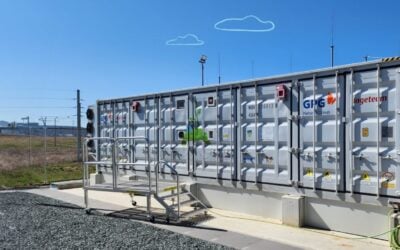A 1MWh battery developed by US manufacturer Aquion Energy and installed at a private estate in Hawaii will allow the area’s residents to meet almost all of their electricity demand with power generated from a connected solar array.
Located on the Kona Coast of Hawaii’s Big Island the estate, Bakken Hale, will be furnished with a solar microgrid that combines Aquion’s patented Aqueous Hybrid Ion (AHI) battery with a 176kW photovoltaic (PV) array.
Enjoy 12 months of exclusive analysis
- Regular insight and analysis of the industry’s biggest developments
- In-depth interviews with the industry’s leading figures
- Annual digital subscription to the PV Tech Power journal
- Discounts on Solar Media’s portfolio of events, in-person and virtual
Aquion announced the deal today. In November the company made headlines when it closed a US$36.8 million funding round, a month after the launch of the second generation range of AHI batteries. Investors in Aquion to date include Microsoft founder and philanthropist Bill Gates.
Aquion claims AHI, which uses saltwater electrolytes with a manganese oxide spinel cathode and carbon composite anode, is better value than its lithium-ion (Li-ion) and lead acid competitors. Capable of being used at a 100% discharge depth for durations of between four and 20 hours, the AHI battery was designed with the aim of maximising consumption of solar energy in mind. In the case of Bakken Hale’s off-grid microgrid solution, this means the battery will charge for eight hours during the day and then discharge over 16 evening and night-time hours to store and use the PV system’s annual 350MWh output. There will be fossil fuels used, but only for back-up in the form of a propane-fueled generator.
Local company Renewable Energy Services will design and install the microgrid at Bakken Hale (not pictured). Image: Renewable Energy Services facebook page.
The microgrid system itself will be designed and installed by local company Renewable Energy Services, Inc. According to Aquion vice president for product and corporate strategy, Ted Wiley, the battery and storage system maker is also working with four other Hawaii-based developers on similar projects.
Ted Wiley told PV Tech why he felt the AHI battery system had been picked by the Bakkens, the family who own the Bakken Hale estate, even over its more commonly known Li-ion and lead-acid counterparts.
“The reason the Bakkens selected Aquion were twofold,” Wiley said.
“They found that Aquion’s AHI chemistry offered the best combination of cost and lifetime performance of all the battery vendors they evaluated, including several lead acid and lithium-ion vendors.”
Wiley also highlighted another difference between AHI and the main incumbents.
“They [the Bakkens] were particularly drawn to the non-toxic, sustainable nature of Aquion’s battery. The batteries are the only ones in the world undergoing Cradle to Cradle certification – expected to be certified in a couple weeks – which is a third party process to audit the fact that Aquion batteries contain no materials of concern and are made with rigorous sustainable processes.”
Wiley said the AHI-based systems could be scaled up or down to almost any size, including for the residential market. He said that with the economics of energy in Hawaii being as they are, a system of this kind could be viable.
“While this will be the largest AHI battery deployed to date, the non-battery components of the system are standard, commercial off the shelf components that are being deployed all over the world in smaller systems. This same type of system could be used to take any house in Hawaii off the grid economically,” he said.
Aquion’s M-Line AHI battery module, of the type to be used in the 1MWh system. Image: Aquion Energy.
As for possible expansion plans beyond that, Aquion at present has a manufacturing facility in Pittsburgh which can produce 200MWh of batteries annually and could be ramped up to an annual output of 1000MWh. When asked how quickly the latter figure could be reached and if there were timelines in place, Ted Wiley said Aquion believed it could “double production capacity every year so about three years from now”.
Bakken Hale’s Earl Bakken, founder of medical equipment company Bakken Hale, said the 1MWh system would “demonstrate that using a solar and battery-powered microgrid is our best solution now”.
“This installation will enable us to meet our around-the-clock power needs with solar generation and will reduce our fossil fuel usage by 97%,” he said.
Hawaii has long been regarded as something of a leader in storage, especially in conjunction with renewable energy generation. As an island state which, proportionally speaking for its size, imports a vast amount of fossil fuels, Hawaii has reached a high penetration of PV generation and this shows no sign of abating. In fact the state’s main utility company has pledged to triple Hawaii’s rooftop solar capacity, to reach 65% of renewable energy in the energy mix and pass on electricity bill savings of as much as 20% onto consumers. As analyst Dean Frankel of Lux Research illuminated in a blog for PV Tech Storage, Hawaii’s energy isolation and the deployment of storage at a grand scale could make the state something of a test bed for solar-plus-storage for the rest of the US and perhaps also the rest of the world.






